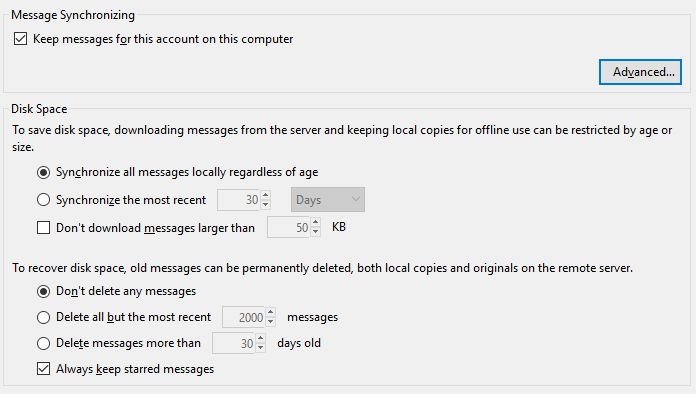I use Thunderbird with Gmail (G Suite), some considerations:
If you really want to have a backup of your emails, you can not ignore the imapmail folder. Just think of the “3” from the 3-2-1 principle of backups, you should have 3 copies: one on Google, one on my machine and the third … on Duplicacy backup. Consider that: what if, for some disaster, Google excludes the account? What if a hacker discovers (using another way, like phishing, etc.) your password, download your e-mails and delete them? Not everyone has two-factor authentication enabled.
Another point: it is perfectly comfortable to do daily backups of the folder (I back up the entire profile folder), remember that they are just text files. However, some elements can be excluded: the index files and the database. They are recreated by Thunderbird itself.
Some email files (Google specific) can also be excluded and don’t need to be restored:
- All Mail
- Important
- Starred
And obviously you don’t need the backup of:
My filters are like this (note that I configure one version in English and another in my language, Portuguese, just in case):
#=============== "UNWANTED" FILES ===============
e:(?i).*Todos os e-mails.*$
e:(?i).*Todos os e-mails.$
e:(?i).*All Mail.*$
e:(?i).*All Mail$
e:(?i).*Importante.*$
e:(?i).*Importante.$
e:(?i).*Important.*$
e:(?i).*Important.$
e:(?i).*Lixeira.*$
e:(?i).*Lixeira$
e:(?i).*Trash.*$
e:(?i).*Trash$
e:(?i).*Starred.*$
e:(?i).*Starred$
e:(?i).*Com estrela.*$
e:(?i).*Com estrela$
# ==== CACHE FOLDER AND ALL ITS FILES AND SUB-FOLDERS
e:Data/profile/cache2/
# ==== EXCLUDING DATABASE
e:(?i).*global-messages-db.sqlite*$
# ==== EXCLUDING INDEXES
e:(?i).*.msf*$
The user in GitHub post called the folder as “local imap cache”. I don’t think it’s a cache, it’s a local version of your emails. The real Thunderbird cache is in Data/profile/cache2/.
And finally, about the “only local” files, they are not in the imapmail folder, but in the local folders folder (which is also inside the profile folder), and obviously must be backed up.





 )
)